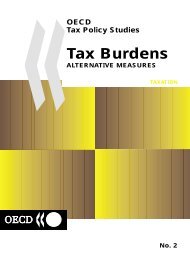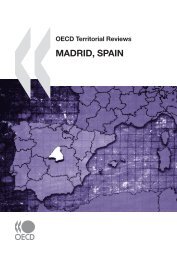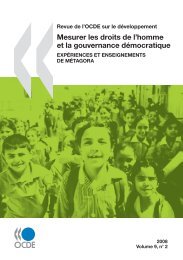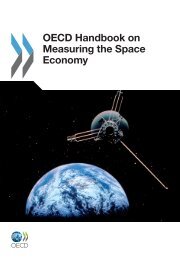Evaluating Country Programmes - OECD Online Bookshop
Evaluating Country Programmes - OECD Online Bookshop
Evaluating Country Programmes - OECD Online Bookshop
Create successful ePaper yourself
Turn your PDF publications into a flip-book with our unique Google optimized e-Paper software.
<strong>Evaluating</strong> <strong>Country</strong> <strong>Programmes</strong><br />
224<br />
Notes<br />
1. The five priorities of the Swiss Development Co-operation outlined in the Guidelines<br />
(1991) are: 1) Promotion of state and economic independence. 2) Supporting the poor.<br />
3) Overcoming environmental problems. 4) Improving conditions of production. And<br />
5) Health care, education and training. In 1998, new Guidelines were formulated. The<br />
five above priorities are also the “Pole Star” for the Swiss co-operation activities.<br />
2. This Law already included an evaluation clause.<br />
3. However, since 1994, important changes have taken place in the implementation of the<br />
guidelines. For this reason, workshops were organised in October and November 1998 within<br />
the SDC to record the developments since 1994. The collection of information was strongly<br />
geared towardss the Division for Bilateral Co-operation, where the pioneering efforts took<br />
place. The SDC works in 21 countries in the South, but only 17 countries are considered priority<br />
countries and for this reason have also a standardised country programme. Meanwhile,<br />
in the other partner countries, development is guided by co-operation concepts. Twelve<br />
country programmes out of 17 existing within the Division for Bilateral Co-operation were<br />
studied. The Division for the Co-operation with the East was integrated within the SDC in<br />
1994. For this reason, the formulation of fully-fledged CPs did not start before 1998. The<br />
two programmes which are the most advanced in the formulation of the country programme<br />
(Kirgistan, Romania) were integrated in the sample. Planned also are CPs for<br />
five other countries in the East, namely Albania, Bulgaria, Macedonia, Russia and the<br />
Ukraine.<br />
4. In addition to the SDC-initiated country programme evaluations, periodic programme<br />
audits on behalf of the Swiss Parliament by the Federal Financial Control also exist,<br />
which indicate relevance, effectiveness and efficiency.<br />
5. In other countries a Federal Department corresponds to a Ministry. For more information<br />
on the Swiss Development Aid, see <strong>OECD</strong>/DAC Development Co-operation Review<br />
Series, No. 20: Switzerland (1996), Paris, 1997.<br />
6. The process of its elaboration was presented at the CPE Seminar 1994 in Vienna<br />
(see Appendix 10.2). In 1998, it served as a model for the elaboration of the country programme<br />
Tanzania, which was the case study for the CPE Seminar 1999 (see chapter 9 in<br />
this volume).<br />
7. In the PEMT philosophy, two types of evaluation are distinguished: self-evaluation and<br />
external evaluation. These have distinct procedures and aims. Self-evaluation is a<br />
responsibility of the specific team involved in a common task, project or programme,<br />
implies an internal look of the team, and is process-oriented. Self-evaluations should be<br />
conducted at regular intervals, e.g. every 6 months. For these characteristics, the ownership,<br />
process, reports and results are with the team. External evaluation is contracted<br />
out, has a limited duration, implies a look from outside and is mainly oriented on<br />
<strong>OECD</strong> 1999

















![CQE=U]^\]Z: KAZAKHSTAN - OECD Online Bookshop](https://img.yumpu.com/3915768/1/190x253/cqeuz-kazakhstan-oecd-online-bookshop.jpg?quality=85)